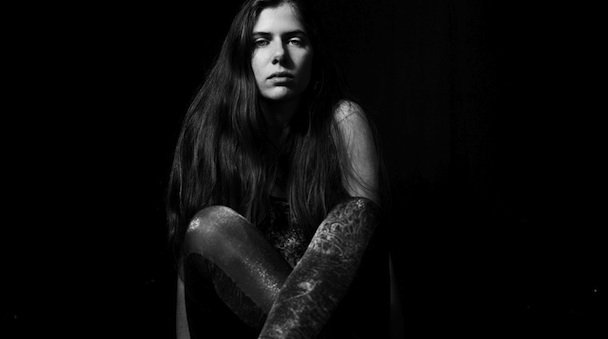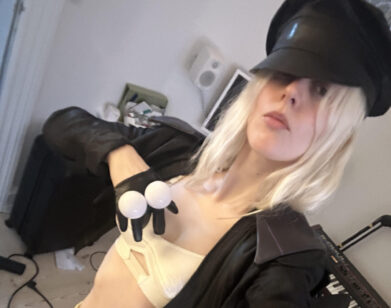Laurel Halo, in Place

ABOVE: LAUREL HALO. IMAGE COURTESY OF TIM SACCENTI
Laurel Halo, the elusive electronic producer and performer, has been quietly producing some of the most resonant analog-laced rhythms of the late 2000s. Emotive, disturbing, and engaging, Halo’s work is a rare breed, the kind that stirs movement both in your limbs and in your brain.
Halo reached critical acclaim for year’s terrifying albeit remarkable Quarantine, a record marked by claustrophobia and corrosive swathes of white noise. Halo’s more recent work may come from a lighter place, but it’s no less intriguing. Earlier this year, she released an EP, Behind the Green Door, which saw her dabbling in dubstep. This week, she followed it up with her latest full LP, Chance Of Rain, which delves further into electronic studies of spaciality and virtuality. Halo’s work unfolds with every listen, as it melds elements of dub with patters of monochromatic drums, woodwind instruments, and surrealistic samplings of conversation, alien warbles, and the occasional orchestral sweep.
While on the road, Halo discussed the influence of her father’s surrealist paintings, the nuances of being a solo artist, and where the road is taking her next.
PAULA MEJIA: You’ve been known to be a video game fan, and it’s reflective in the occasional 8-bit samples and splices you can hear in your music. Have you played GTA V? Flying Lotus curated one of the radio stations. Apparently it’s terrific.
LAUREL HALO: You know, as a piss take I once said that “Halo” was lifted from the video game, but people took that quite seriously! In truth, I don’t play video games, and I don’t use 8-bit sounds. I have occasionally sampled video game trailers, but only because of the epic or cosmic content of the sound, not because of any association with the games themselves or the act of gaming. Basically I like the music from some video games, but I’m not a game fan. If anything I’m more interested in virtuality and the idea that virtual is an analog to the word “almost,” and how violence can be represented, unrelated to the body.
MEJIA: You spent some time in Berlin around the time Behind the Green Door was released. Where has your nomadism taken you since then?
HALO: I’ve been lucky to travel this year for shows. Monterrey, Mexico was one of my favorite shows this year. I played outside at a house with an incredible view of the valley, with a slight drizzle. I was expecting to get electrocuted, but the crowd was really up for it. I played in a massive theater in Montreal with incredible sound for MUTEK, in a disused Soviet-era hotel ballroom in Krakow, in an all-you-can-eat Chinese buffet in Ridgewood with the Bunker’s soundsystem. It’s surreal, and I’m grateful for the chance to do this.
MEJIA: I’ll bet. You’ve mentioned a certain toxicity that punctuated the recording of Quarantine—which is magnificent, but you can hear the catharsis that went behind it. What headspace were you in when recording Chance Of Rain?
HALO: I started ideas for Chance Of Rain as early as last fall, when I was touring doing live hardware edits of Quarantine tracks. That process of re-engineering Quarantine was quite inspiring, in the sense that I found more joy in playing the edits of Quarantine than in the actual making of the record! So I decided that I wanted the next recording process based around my live set, and not the other way around. With Chance Of Rain, I wanted the sound to be moody and twisted like Quarantine, but also be more active-sounding and joyful, and have the music itself speak its own language rather than have this lyrical directive.
MEJIA: On that note, how was the recording process of Chance Of Rain different than that of Quarantine? Or was it similar?
HALO: Basically, with Chance Of Rain, the tracks were patterns made to be played live first, then recorded, arranged, and edited, with additional software manipulation and overdubs during the final stages. There’s similarities in the sense that both were fleshed out on the computer, but where Quarantine was a lot of in-the-box, concrete, Chance Of Rain was freed of that somewhat.
MEJIA: I saw some of your father’s artwork, and it’s spectacular. To what extent do you think his work exploring surrealist landscapes, particularly of industrial settings, influenced you both consciously and unconsciously in your own work?
HALO: My father is a big inspiration. I’ve seen his paintings and process since a young age. He makes these surreal and industrial works imbued with hope, humor, and loss. They’re quite faceted for being representational on the surface. There’s a lot more going on than what you see. I love the sense of light and proportion in his work.
MEJIA: I’ve read that you’re selective of utilizing your own voice when performing live. Are you progressing towards doing so, or is there a specific reason why you choose not to utilize your voice?
HALO: I’ve never sung that much in my live set, maybe one or two tracks per night, even when I performed around the release of Quarantine. Vocals are not central to what I do, and I’ve never liked singing live. I’ve always been more inspired by rhythm, texture, harmony than vocal melodies and lyrics. Plus, for me, I can better express my musical ideas through instrumental music than vocal music, the emotional interpretation of which can easily supersede the actual musical content or aim.
MEJIA: How have you evolved as a musician since you first started to record?
HALO: Big question! [laughs] I suppose I’ve gotten better at the technical and creative sides of writing and recording, and better at decision making with both, too.
MEJIA: As a solo artist, how do you work to set parameters for yourself and keep motivated?
HALO: It can be difficult when you’re a solo artist, because you don’t have another input saying if these ideas are good or just total shit! So sometimes it’s easy to go in circles about a particular synth sound or drum sound. It’s not hard for me to stay motivated once I’m in the flow of it, although it really depends whether deadlines work or not. Generally a good parameter for me is to try something I haven’t done before either in the writing or recording process, to break old patterns and habits. Even if I eventually return to something similar, I’ll have gotten there from a different starting point and engaged in a different process.
MEJIA: How do you retain the magic of the experience for yourself performing live, as much as you do for the listener?
HALO: The magic of playing live doesn’t go away. Of course there are some shows where your energy level is low, or the sound is bad, but part of the joy is the challenge to bring this energy and realize it despite the physical circumstances.
MEJIA: What kinds of spaces are you drawn to when performing?
HALO: I’m most drawn to performing in spaces that have clear, chunky, well-tuned PAs. Could be club, warehouse, venue, Chinese buffet, whatever. I’d love to play in theaters and music halls, although I would have to make a different live set for those sitdown environments.
MEJIA: If you were to score a film, what kinds of films would you be drawn to?
HALO: Psychological thrillers! [laughs] I would love to score abstract, meditative films, ones that require an undercurrent of musical urgency that’s not on the sleeve, that’s more atmospheric. Where shots of desolate landscape unfold over the course of minutes and seismic decay requires some melted percussion, or where there’s a crisis that is made that much more tense by still, deadpan music. I wouldn’t mind writing some epic string sections. I’d also be into writing music for biting satires, it would be so much fun to write insipid or over-the-top situational music.
LAUREL HALO’S CHANCE OF RAIN IS OUT NOW. SHE IS CURRENTLY ON TOUR IN EUROPE. FOR MORE ON THE ARTIST, PLEASE VISIT HER WEBSITE.






